- Home
- Brian Garfield
The Last Bridge Page 8
The Last Bridge Read online
Page 8
And then there was J. D. Hooker—a brutal man, small of eyes and small of brain. But Hooker’s eyes could see twice as far as any other man’s, and Hooker’s ears could pick up the tiniest of sounds, and if a man wanted a bridge blown up properly, he sent for J. D. Hooker.
Theodore Saville drank his third cup of coffee and did not smile when he discovered Tyreen’s eyes on him. Saville was an inveterate beer drinker; he had the constitution of a truck horse. In his twenty-four years of service he had lugged himself up to a captaincy from the ranks, mainly by sheer brawn and doggedness. If there was a more reliable man in the Army, Tyreen had not yet met him. Still holding Saville’s eyes, Tyreen smiled and nodded briefly. Saville held out the coffee jug, and Tyreen accepted it. He had been awake twenty-four hours now, and it would be at least another day before he would have a chance to sleep.
Tyreen knew better than to slow down long enough to give himself a chance to think. It would do no good to consider his position. He was sick, and he had no business being here; he was a tired man, jaded and worn out. But he would keep up with the rest of them—more than that, he would stay ahead of them. He did not allow himself to wonder how.
He was dangerously close to a self-inspection. He had the need to act. He stood up and said, “We’ve got about fifteen minutes. Better start getting the gear together.”
Chapter Eleven
0600 Hours
TYREEN’S tongue played with one of his back teeth. It was a false tooth, hollowed out. The Army had inserted a cyanide pill inside it. It was no hard task to work the tooth loose with the tongue and swallow the poison. It could be done without once opening the mouth. A man had been known to kill himself with the cyanide pill in his sleep.
He had sheet metal in the soles of his jump boots and a load of equipment on his back that would stagger a mule: he had his submachine gun, his tools, his rations, his ammunition, and the tank of an underwater breathing apparatus. His parachute hung down below the seat of his pants. Canteen and pistol and bayonet rattled against his thighs, hung on his ammunition belt. He glanced at Saville, who carried all the same equipment, plus a sackful of radio gear, and at J. D. Hooker, who carried a wickedly heavy sack of explosives and demolition equipment, and at Sergeant Sun, who carried a Czech light machine gun with a bipod mount, and at Nguyen Khang, who carried the boxed ammunition belts for the machine gun.
Theodore Saville picked up a knapsack full of Communist-made grenades and hooked it to the front of his harness above his chest chute. He drained the last of the coffee into his mouth and tossed the jug aside. He took a last pull on his cigarette and ground it out underfoot. Carrying two hundred pounds of metal and fabric, he moved effortlessly.
Tyreen said, “Hook up.” He made his way forward to the cockpit.
McKuen was struggling with the controls. He glanced around briefly. “We’re flying on a wing and a swear, Colonel. Number two engine’s making plenty of trouble. How far is it to that emergency strip in the mountains?”
“About forty miles from the drop zone.”
“I wish I had me four-leaf clover,” said McKuen. “You’ve got about three minutes. Do I keep her on twelve hundred feet?”
“Dead level,” Tyreen said.
“That might be easier if I didn’t have to talk to the altimeter through interpreters. I’ll be givin’ you a red warning light now. The light will flash green when it’s time for you gentlemen to do the Geronimo act. That is, presuming the green light bulb ain’t burned out. I tested it back at Nha Trang, and it worked then. But this aeroplane didn’t come with a written guarantee, you’ll be understandin’.”
“Sing out when you flash the light, just to be sure.”
“Sure and I will. And, Colonel …?”
“What?”
“Good hunting.”
“Thanks, McKuen. I’ll see you back in Saigon.”
“Sure you will.”
“Good luck, Mister Shannon,” Tyreen said.
“And the same to you, Colonel.” Shannon’s face was tight.
McKuen said, “Buck up, me lad. It’ll be something to be tellin’ your grandchildren about.”
“If I live to have any.”
“So long,” Tyreen said, and went back into the plane. He heard McKuen’s voice following him:
“Ciao.”
Tyreen pushed past the others to the jump door in the tail section. The ceiling was low here, and he had to stoop. The red warning light glared at him unblinkingly. “Watch the light,” he said. “And be ready to pull your emergency chutes. We’re pretty close to the water.”
“And pretty close to the reef,” Saville said. “If any of us overshoot by as much as three seconds, he’ll wind up with a hunk of coral up his ass.”
J. D. Hooker said, “Then you better move fast, Captain. You’re comin’ out last.”
“Thanks for the concern, Sergeant.”
“Turn on your oxygen tanks, and watch that light,” Tyreen said.
He stood in the open door with the cold night whipping past. At twelve hundred feet there was a light drizzle of rain. Pellets of water stung his exposed face. It was a long three minutes—was the light working? He braced his hands in the doorway. His trouser legs flapped violently against his calves. One of the sergeants was crowded up close behind him. He broke out in a dizzy wave of chills. The wind stung his eyes, and he could not keep them open long enough to see what was below. A burst of wind almost tore him out the door. He heard a small sound—McKuen bellowing at the top of his lungs from the forward cockpit. The light flickered green. He felt the brief pressure of Saville’s hand on his shoulder. He shouted, “Go!” And thrust himself out into the night.
There was nothing to see. Dark gray false dawn flooded his vision. He fell through space, turning slowly. Abruptly the shroud lines fluttered stiff; the chute opened with a snap that grabbed his shoulders and all but tore him in two. He felt flashes of bright pain from the harness buckles and knew he would suffer the bruises for days.
He had the feeling he was turning cartwheels; he threw his head back and gulped for air. He thought he could make out several billowing canopies above him. The dim red flames of the C-47’s exhausts wheeled away as it circled across the sky in a steep climb; he could hear the strained buzz of its engines.
His heavy load of equipment dragged him swiftly downward against the pull of the shroud lines. He felt sick in a moment of vertigo. There was a jagged reef down there; he had an instant of stark fear. His eyes found and locked on the vague flashes of surf crests. He dropped plumb.
The sea would be cold. He filled his lungs with air. He thought he heard someone cry out. His body jerked in a spasm of tremors, and then his boots cut the surface and the frigid black water swallowed him.
The bitter cold paralyzed him, constricting his chest; he felt immediately suffocated. The shroud lines wound around him like spaghetti. He pedaled with his legs in a moment of panic and tore a line from around his throat; instinct born of hard training moved his hands to the harness buckles, and his fingers fumbled with them. Water got in his nose and eyes and mouth. The buckles would not give way to his attacks, and he let them go; he clawed at the scuba mouthpiece, found it, and put it in his mouth. Flashes of color darted in his vision. He blew through the mouthpiece with his last reservoir of spent air and wheezed a rattling breath inward; he choked on the spray of water it forced down his lungs.
His body swept back and forth like a pendulum, snarled in the shroud lines, tugged about by currents in the cold surf. The canopy had collapsed on top of him and the weight of his equipment slowly pulled him down. He breathed in short, rapid bursts; the pure oxygen made him lightheaded. He made himself hang idle until his pulsebeat came under control, whereupon he made a second assault on the harness fasteners.
A fish, or a strand of seaweed, brushed his open eye, and he jerked his head back. When he broke loose from the parachute, the dead weight of his equipment carried him right down until his ears popped and his head was
ready to cave in with pressure. His heavy boots tripped over a rough bottom and he went to his knees, moving like a dream figure in a slow-motion film. The water was murky; there was no light from above; he could not see a thing.
He turned until he felt the undercurrents press against his face, and moved that way, into the undertow, feeling ahead of him with a hand he could not see. It was hard to judge the slope of the bottom. Spires of coral got in his way; sea moss made footing slippery, and once he recoiled when his hand fell upon a slimy surface that contracted and moved under his grip.
It took him eighteen minutes to paddle across the reef and cross the calmer lagoon to the beach.
The narrow strip of sand lay along a spit of land, barren and strewn with small boulders. He stood erect in three feet of water and saw two men walking down the hard beach toward him. He dragged himself out of the lagoon and stood with his legs splayed apart; he could feel the needle of each separate point of pain.
Saville came forward, his hair plastered down over his bald spot. The knapsack full of grenades dangled from his right hand; one of its harness straps had broken. A stocky man in gray fatigues trailed him.
Tyreen spat the aqualung mouthpiece out and licked his teeth. He stood swaying. Saville stopped, and the other man halted obediently; he was a large-eyed young man with blond hair cut so short he seemed bald.
Theodore Saville said, “Glad you made it, David.”
“So am I.”
“Corporal Smith.”
“Yes, sir.” The Corporal’s expression resembled that of a corpse with its eyes open.
Saville said, “Here comes one of the others.” Tyreen looked out toward the reef. Saville shook his head violently to clear water from his ears. He said, “Getting light. Let’s get everybody together and bury these frogman lungs and get the hell off this beach before we get zapped.”
Tyreen said, “How far do we have to go, Corporal?”
“A long way, sir. A good long way.”
Chapter Twelve
0625 Hours
THEY pushed inland and made a halt at dawn on the edge of a rice paddy. The rain had suspended, but on the mountains to the west hung a solid bank of black clouds. Theodore Saville spread his map on the ground, and the young blond Corporal, Luther Smith, put his finger on the map. “We’re here.”
Saville moved his hand across the map. “This is Chutrang. Beyond the Sang Chu gorge. Do we go by the bridge on our way?”
“Pretty close to it,” said Corporal Smith. The tone of his voice was as unnatural as the deadness of his eyes and the corpse-hued pallor of his face. “We don’t have to cross the river, though. We stay north of the river all the way. There’s a village of friendly Montagnards got their camp right here, a few miles this side of Chutrang. Captain Kreizler and the rest of us been working pretty close with them. Colonel, it ain’t easy to get through from here to Chutrang. The Vietminh got patrols all over the mountains. If we had a choice, I’d say try it at night, but then you got to worry about booby traps you can’t see at night.”
Tyreen put the muzzle of his submachine gun on the map. “We’re pretty close to this road now, aren’t we?”
“Yes, sir. About half a mile the other side of this paddy.”
“Much traffic along that road?”
“Not much,” said Corporal Smith. “Now and then a patrol. Some rice carts and stuff like that. Once in a while a staff car or a truck.”
Tyreen spoke to Saville: “It’d save a good deal of time if we could hijack a truck. I think it’s worth gambling the time to set up an ambush on the road.”
Corporal Smith said, “May not be nothing come along all day.”
“We’ll give it an hour or so before we head into the hills on foot.” Tyreen turned back to the Corporal; Smith’s eyes flickered when they touched Tyreen’s. Tyreen said, “I want to know exactly what happened up there last night, Corporal. From the top.”
“Ain’t a hell of a lot to tell, Colonel. I ain’t too sure what did happen. We were set to divvy up in two parties, with eight of us climbing up above to make a lot of ruckus and distract the bridge guards while Captain Kreizler and three others slipped under the bridge pylon and set the charges. But we never got near that far. We were still four miles down the road. Four dozen trails through them mountains, and the Vietminh just had to pick that one to lay out an ambush. We walked right into it. They had us in a buzz saw—machine guns on both sides of the road, and one up ahead. Soon as we walked in, they closed up the rear with another machine gun squad.”
Saville said, “How many Reds, Corporal?”
“How do I know? It was getting dark, and they was hid back in the trees. Maybe a platoon. They had at least four seven-six-two machine guns, and they were layin’ into us with a mortar, too. They let us walk all the way in, and then they opened up with everything they had. It was point-blank. We all flattened out on the trail and tried to roll into cover, but they had most of us chewed to pieces before anybody got off the road.”
Tyreen said, “Did you see what happened to Captain Kreizler?”
“I didn’t have a whole lot of time to pay attention. I was seventh man back in the column. I saw Lieutenant Chinh get hit. In the left arm, I think. He was shoving the Captain down out of the line of fire. Rammed right into the Captain with his shoulder to knock the Captain down. Good thing he did, too. Those machine guns were cutting a field of fire about three feet off the ground. Just right to cut you in half, if you’re standing up. I hit the dirt when the first one opened up. Saw Lieutenant Chinh knock the Captain down, and then I was pretty busy finding cover. I don’t know how the hell they missed killing me, and that’s a fact. They started lobbing mortar into the road, and that chewed us up pretty bad.”
Corporal Smith’s voice was a lifeless drone. He added, “I rolled into the trees and tried to find something to shoot at. By the time I cleared my weapon, the shooting had stopped and I couldn’t see anybody, except some of the boys out in the road. I counted eight dead. I couldn’t find the Captain or Lieutenant Chinh, so I figured they must have got to cover the same way I did. There was a couple big holes where the mortar had hit us. I backed away through the brush and hid myself out good in a patch of trees. After a while I heard some talking and laughing and a bunch of troops came by. I kept quiet. Tried to get a look, but it was dark by then. They seemed to be prodding a couple prisoners along, and the only ones from our team that wasn’t dead on the road had to be the Captain and Lieutenant Chinh. I didn’t see their faces, though, so I wasn’t sure. It took me a while to get out of the area. Then I taped the radio call to you and sent it out by balloon so they wouldn’t be able to get a fix on me.”
“When did you find out that Captain Kreizler and the exec had been taken prisoner?” Tyreen said.
“I found that out for sure when I got back to camp. Some of the Montagnards had been down in Chutrang peddling opium when the troops came in. The Yards saw them bring Captain Kreizler and Lieutenant Chinh into the militia compound. Lieutenant Chinh was wounded. The Yards told me Captain Kreizler looked like they’d pushed him around a little, but he wasn’t bleeding or anything. We’ve had people keeping watch ever since. Last I heard, they hadn’t moved either one of them out of the compound. There’s kind of a grubby little jail where they keep prisoners locked up. No windows, just a steel door with a little hole in it, like a slot—they shove bowls of food in through that. It’s right beside the troop barracks. They keep a pretty heavy guard on it around the clock, especially when they’ve got prisoners they figure are worth the trouble.”
Tyreen said, “That’s a battalion headquarters at Chutrang. If they think Kreizler’s important enough, they’ll want to have him removed to higher headquarters tor interrogation.”
Saville said, “Or they’ll send their best torture experts down to question him at Chutrang.”
“We’ll have to find out,” Tyreen said. “But first we’ve got to get there.”
Saville stood up and walked arou
nd examining each man’s pack adjustments. Tyreen got up slowly and walked away, and Saville said, “Okay, let’s move out.”
They went single file through the brush, spread in a ragged line. The rain held off, but it was clear that a squall had the mountains roughed up; if McKuen was up there, he would not find the weather any help. The peaks reared up out of sight into the clouds, and it was impossible to miss the shadow-streaks of heavily falling rain over the slopes.
Tyreen moved like a mechanism, bruised in his joints and irritably weak. The exertion of walking less than a mile over flat terrain left him short of breath and profusely sweating. They broke out of the high elephant grass onto the dirt-tan stripe of the road, and Tyreen said, “Sergeant Khang.”
The team milled around, spaced between mudholes in the road. Sergeant Nguyen Khang came up and stared at Tyreen with his slightly bemused expression. J. D. Hooker said, “I can string a wire across the road and plant a Claymore mine, Colonel. Anything comes along, we’ll blow it to pieces.”

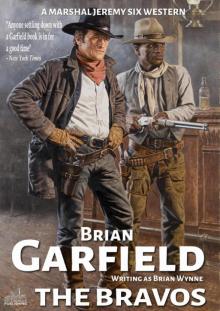 Marshal Jeremy Six #3
Marshal Jeremy Six #3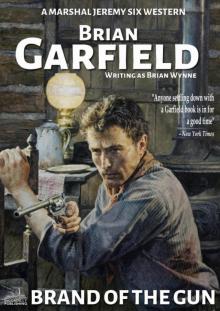 Marshal Jeremy Six #6
Marshal Jeremy Six #6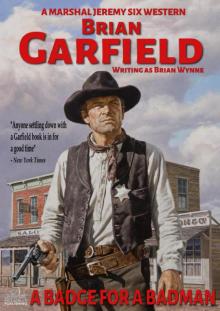 Marshal Jeremy Six #5
Marshal Jeremy Six #5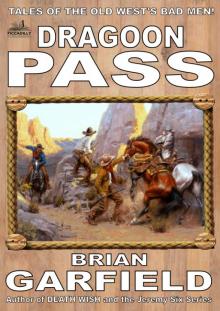 The Outlaws 2
The Outlaws 2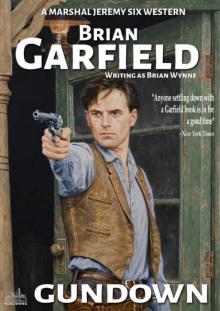 Marshal Jeremy Six #7
Marshal Jeremy Six #7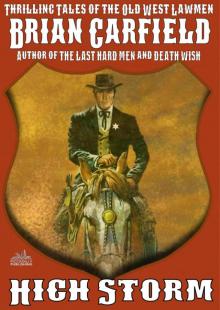 The Lawbringers 4
The Lawbringers 4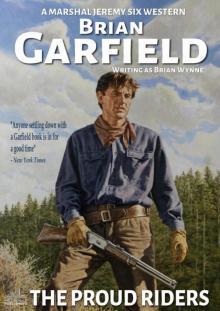 Marshal Jeremy Six #4 the Proud Riders
Marshal Jeremy Six #4 the Proud Riders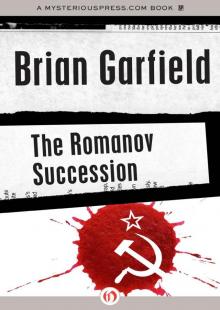 The Romanov succession
The Romanov succession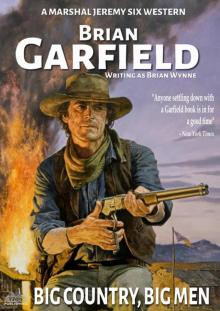 Marshal Jeremy Six #8
Marshal Jeremy Six #8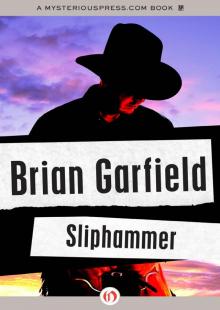 Sliphammer
Sliphammer Line of Succession
Line of Succession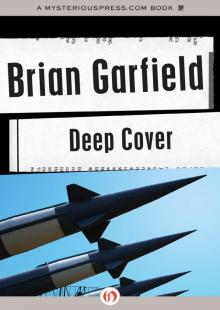 Deep Cover
Deep Cover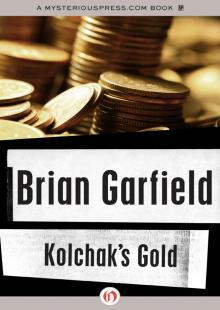 Kolchak's Gold
Kolchak's Gold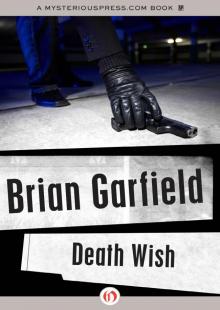 Death Wish
Death Wish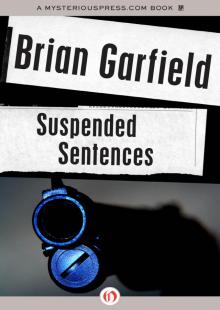 Suspended Sentences
Suspended Sentences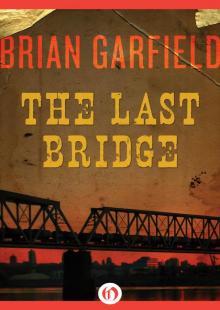 The Last Bridge
The Last Bridge Relentless
Relentless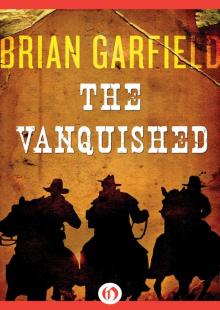 The Vanquished
The Vanquished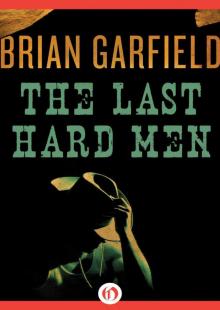 The Last Hard Men
The Last Hard Men Hit and The Marksman
Hit and The Marksman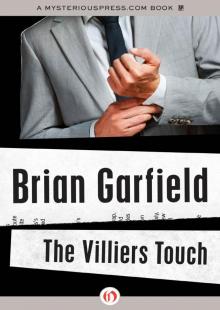 Villiers Touch
Villiers Touch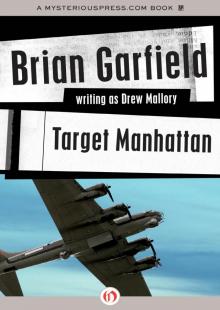 Target Manhattan
Target Manhattan Marchand Woman
Marchand Woman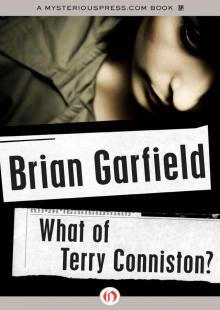 What of Terry Conniston?
What of Terry Conniston?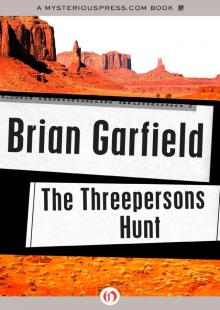 Threepersons Hunt
Threepersons Hunt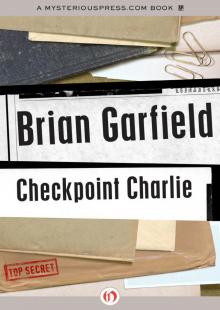 Checkpoint Charlie
Checkpoint Charlie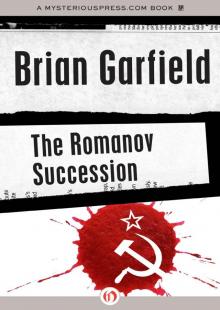 Romanov Succession
Romanov Succession Necessity
Necessity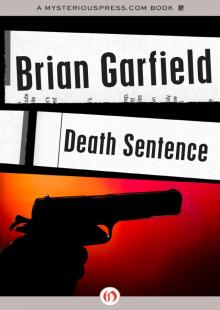 Death Sentence
Death Sentence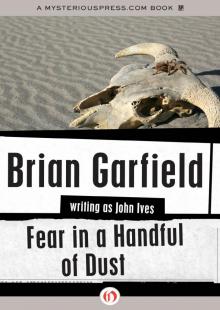 Fear in a Handful of Dust
Fear in a Handful of Dust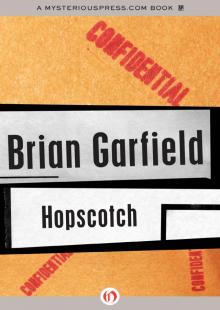 Hopscotch
Hopscotch